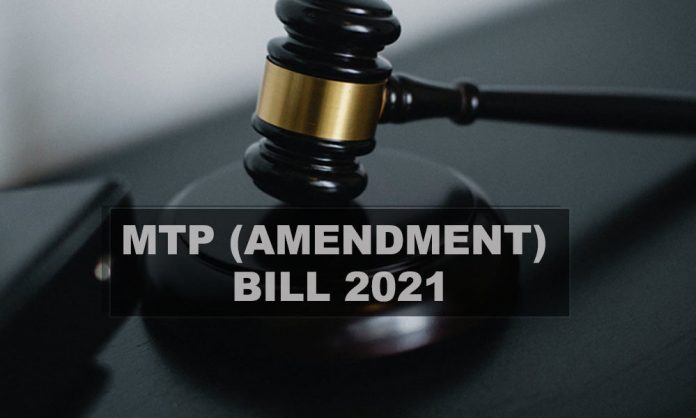This article is written by Harman Juneja, a student of Dr. B.R. Ambedkar National Law University, Rai, Sonepat. The article talks about the significance of the Medical Termination of Pregnancy Act, 2021 in the case of Mahima Yadav vs GNCTD
Table of Contents
Introduction
The Medical Termination of Pregnancy (Amendment) Bill, 2020 was approved by the Union Cabinet last year. The Act proposes to increase the time limit for terminating a pregnancy from 20 to 24 weeks, making it easier for women to safely and legally end an unwanted pregnancy.
Previously, women who wanted to end a pregnancy after 20 weeks had to go through a lengthy legal process. This violates women’s reproductive rights, as abortion is regarded as a crucial element of their reproductive health.
An analysis of the Medical Termination of Pregnancy (Amendment) Act, 2021
Various verdicts that resulted in harm and conflict of interest, as well as laws, came together to drive the government to pass the recently authorized Medical Termination of Pregnancy Amendment Bill, 2020. Dr. Harsh Vardhan, Minister of Health and Family Welfare, tabled this law on March 2, 2020, and it is widely seen as a significant step forward for women’s rights.
The Act governs the circumstances under which a pregnancy can be terminated. The Act extends the time frame in which abortion can be performed. Previously, if abortion is performed within 12 weeks of conception, one doctor’s opinion is required, and if it is performed between 12 and 20 weeks, two doctors’ opinions are required. The Act enables abortion on the advice of one doctor up to 20 weeks, and two doctors between 20 and 24 weeks for specific categories of women. The Act establishes state-level Medical Boards to determine whether a pregnancy can be aborted after 24 weeks if there are significant fetal abnormalities.
It has also increased the gestation limit for women in “special categories,” such as rape survivors, incest victims, and other vulnerable women, such as differently-abled women and adolescents. A Medical Board will be formed in each state and union territory, comprising a gynaecologist, paediatrician, radiologist, and other members as determined by the government. If pregnancy has progressed beyond 24 weeks, a Medical Board will be consulted in the event of a significant fetal abnormality. Medical practitioners will only be able to share details of a woman whose pregnancy has been terminated to a person authorized by law, according to the Act.
According to the original Act, any pregnancy that arises as a result of a married woman’s or her husband’s inability to utilize contraception to limit the number of children may constitute a grave injury to the pregnant woman’s mental health. The new bill replaces the phrase “married lady or her spouse” with “woman or her partner”. More liberal moves will begin to be taken as a result of this.
Benefits of the Act
- After the 20th week, a lot of fetal anomalies are discovered, changing a wanted pregnancy into an unwanted one. The fetal anomaly scan is usually performed during the 20th and 21st weeks of pregnancy. If this scan is delayed and it finds a deadly defect in the fetus, the 20-week period is the limit. This proposal would allow for the termination of a pregnancy if a fetal abnormality is discovered after 20 weeks.
- The law will assist rape victims, sick and underage women in legally terminating undesired pregnancies.
- Significantly, the Act also applies to unmarried women, removing one of the 1971 Act’s regressive provisions, which prohibited single women from citing contraception failure as a cause for obtaining an abortion. Allowing unmarried women to medically terminate pregnancies while also protecting the privacy of the person seeking an abortion will give women the reproductive rights they are entitled to.
Issues related to the Act
- The viability of the fetus has always been a major part of the legality of controlling abortions. The period during which a fetus is capable of existing outside the womb is referred to as viability. This ‘viability’ naturally improves as technology advances, infrastructure is upgraded, and skilled experts are in charge of medical care. Currently, viability is estimated to be about seven months (28 weeks), however, it can happen sooner, even at 24 weeks. As a result, late pregnancy abortion may jeopardize the fetus’ viability.
- Despite their unlawful status, sex determination centres remain in business due to the preference for male children. There are fears that a more liberal abortion law may exacerbate the situation.
- According to 2017 data, 59 countries authorized elective abortions, with only seven countries (Canada, China, the Netherlands, North Korea, Singapore, the United States, and Vietnam), allowing the operation after 20 weeks.
- Critics of the law have also pointed out that it ignores the ongoing healthcare crisis created by the pandemic. Given this, and India’s chronic dearth of doctors, they argue that requiring women to seek the advice of two practitioners and a medical board for some types of abortions is unjust. Disability groups have also raised concerns, which we will discuss later.
- As IndiaSpend published a report in September 2020, abortion is still stigmatized in India, even among doctors. Doctors have been reported to refuse abortions on “moral” grounds or to ask women to bring their spouses or parents along for the procedure. This is especially true when the abortion is requested for reasons other than a woman’s physical health, as defined by the MTP Act, but because it may result in damage to her mental health which is also protected by the Act, according to these reports.
Analyzing the case of Mahima Yadav v. Government of NCT of Delhi and Ors, (2021)
Facts of the case
In this case, the petitioner has filed the petition to obtain permission to have her pregnancy terminated medically. The provisions of the Medical Termination of Pregnancy Act, 1971 have been invoked by the petitioner. Although the petitioner’s fetus is more than 24 weeks old, the learned counsel appearing on behalf of the petitioner contends that she should be allowed to carry out the termination due to the anomalies of the fetus and the risk to the petitioner, who suffers from severe hearing issues.
Findings of the court
- The new amendments in the Medical Termination of Pregnancy Act, 1971 allow the termination of a fetus in case of substantial abnormalities even after a 24 weeks period which is clear from the reading of Section 3 of the Act.
- The fetus was more than 25 weeks old. Thus, the Medical Superintendent of AIIMS was ordered by the court to appoint a Board of Doctors to examine the Petitioner. A Chairperson and seven Members, as well as a Member Secretary, made up the Board of Directors. Following the examination of the petitioner, the said Board was to provide a report.
- A review of the Medical Board’s decision revealed that the petitioner, or mother, is a known heart sufferer who had been prescribed blood thinners. The Medical Board believed that the fetus had warfarin embryopathy as a result of the blood thinner delivered to the petitioner, which had a risky prognosis in terms of immediate and long-term results, especially given the cerebral bleeding and ventriculomegaly.
- The petitioner’s husband claimed that they know of the risk, as mentioned by the medical board and they were ready to undertake abortion.
- Given the fetus’s above-mentioned state, the court found that the described circumstances represent substantial fetal abnormalities that could affect the fetus’s physical condition, even if the pregnancy is permitted to mature. This would be harmful to both the mother and the child. Since the Amendment Act of 2021 had already been notified, and in light of the settled legal position established in the different judgments that were taken into consideration, the court thus concluded that pregnancy termination should be permitted even beyond 24 weeks.
- The court looked at various cases and found that the recent amendments of the MCT are in line with the decisions taken earlier in various cases like Shaikh Ayesha Khatoon vs Union Of India & Ors (2018), Nisha Suresh Aalam v. Union of India & Ors (2018), Priyanka Shukla v. Union of India & Ors (2019), etc. In all these cases, termination was allowed after the said 20 weeks period which was prevailing at that time. Thus, the court found the amendments confirming these cases and the precedent set in these cases.
Viewing the judgment as a good precedent
The High Court, allowing the petitioner for abortion after the 24 weeks mark, sets a good precedent for upcoming cases as well. Even the amendment does not allow every termination after 24 weeks, but only those abortions in which the fetus develops some serious abnormalities which are also prevalent in this case. The High Court looked at all the merits and allowed the abortion. The Supreme Court and High Court are vested with the power of judicial review in India under Article 226 of the Indian Constitution. In this case, as well as in previous decisions considered by the court, abortion was permitted after 24 weeks of pregnancy. Moreover, in all these cases, the allowed period was 20 weeks but still due to the need for termination, the same was allowed. Therefore, the following case not only sets a good precedent for abortion over 24 weeks but also finds the amendment in congruence with the earlier precedents.
Conclusion
India has legislation in place when it comes to reproductive rights. Especially when the majority of the world’s women, that is, more than 40% of women of reproductive age live in 125 countries where abortion is severely limited, either prohibited or only permitted to save a woman’s life. What is lacking, however, is awareness and implementation. This is true in the cases of abortions, which are deliberate terminations, and miscarriage, which is a natural occurrence, both of which are traumatic. Though the Medical Termination of Pregnancy (Amendment) Act, 2020 is a start in the right direction, the government must guarantee that all clinical practice norms and standardized protocols for abortions are followed at health care institutions across the country. Furthermore, the issue of abortion must be decided following human rights, sound scientific principles, and technological improvements. The Act will help provide opportunities to single ladies as well and more time for abortion if necessary. The decision in the case of Mahima Yadav v. The Government of the NCT of Delhi strengthens the amendment and will act as a good precedent for future cases.
References
Students of Lawsikho courses regularly produce writing assignments and work on practical exercises as a part of their coursework and develop themselves in real-life practical skills.
LawSikho has created a telegram group for exchanging legal knowledge, referrals, and various opportunities. You can click on this link and join:
 Serato DJ Crack 2025Serato DJ PRO Crack
Serato DJ Crack 2025Serato DJ PRO Crack









 Allow notifications
Allow notifications


